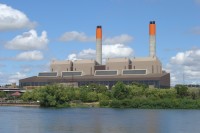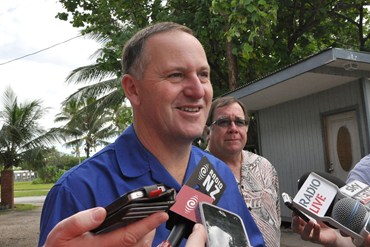 Simon Johnson looks at how New Zealand Aluminium Smelter Limited is behind the Meridian/Genesis deal keeping the Huntly Thermal Power Station burning coal as the threat of closing the Tiwai Point smelter is stalling the construction of consented renewable energy projects.
Simon Johnson looks at how New Zealand Aluminium Smelter Limited is behind the Meridian/Genesis deal keeping the Huntly Thermal Power Station burning coal as the threat of closing the Tiwai Point smelter is stalling the construction of consented renewable energy projects.
My last post at Hot Topic was about energy companies Meridian and Genesis doing a deal to keep the Huntly Thermal Power Station open (and burning coal) for an extra four years.
My post really just noted how backwards the decision was in terms of reducing emissions of greenhouse gases. And that the expected shut-down of Huntly represented the only predicted drop in energy emissions New Zealand had advised to the UNFCCC. And that reduction has just gone up in smoke.
However, New Zealand Aluminium Smelters Limited and the Tiwai Point smelter have a malignant background role in the Huntly deal.
Meridian Energy said the deal was necessary to provide security of energy supply if the hydro lakes are low. That is only the case if the next ‘cab off the rank’ of renewable energy capacity is not built to replace Huntly. The generators don’t want to build any new renewable capacity if the smelter closes and Meridian then releases cheaper Manapouri hydro electricity onto the grid.
Hence helter smelter deja vu all over again.
Continue reading “Helter smelter deja vu: Tiwai Point uncertainty stalls NZ renewables”

 In my post at The Daily Blog today —
In my post at The Daily Blog today —  The New Zealand Government has taken refuge from the challenge of climate change by recasting it as a matter of political positioning. This is nowhere more clearly seen than in the frequently reiterated claim that we are doing our “fair share” in the international effort to reduce emissions. It’s a brash claim in any case, when our unconditional 5 percent reduction target on 1990 levels by 2020 is compared with the 30 percent unconditional target of Norway and Switzerland or the 20 percent target of the EU as a whole. But the Government prefers comparison with our “trading partners” Australia, America and Canada, and also largely excludes the emissions associated with farming on the grounds that the world needs the food we produce.
The New Zealand Government has taken refuge from the challenge of climate change by recasting it as a matter of political positioning. This is nowhere more clearly seen than in the frequently reiterated claim that we are doing our “fair share” in the international effort to reduce emissions. It’s a brash claim in any case, when our unconditional 5 percent reduction target on 1990 levels by 2020 is compared with the 30 percent unconditional target of Norway and Switzerland or the 20 percent target of the EU as a whole. But the Government prefers comparison with our “trading partners” Australia, America and Canada, and also largely excludes the emissions associated with farming on the grounds that the world needs the food we produce.
You must be logged in to post a comment.